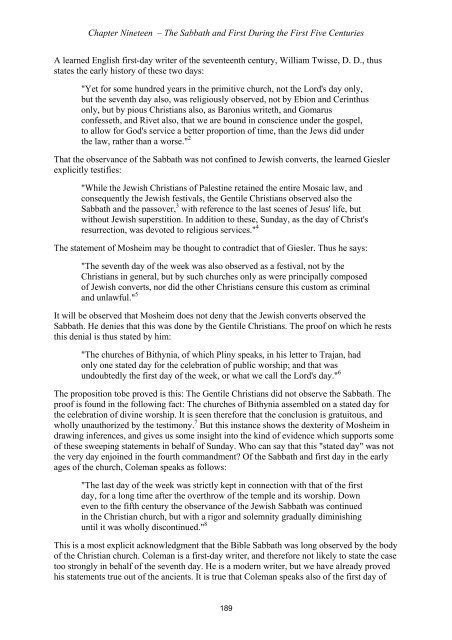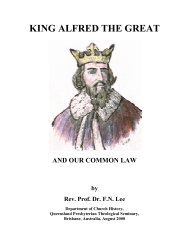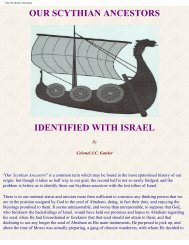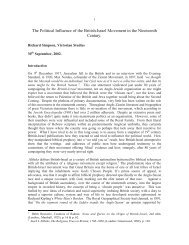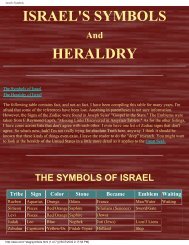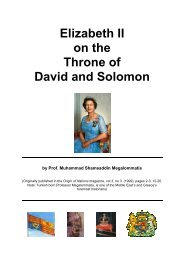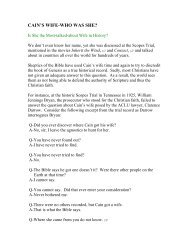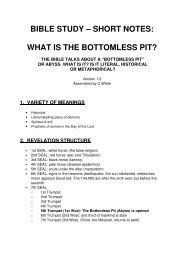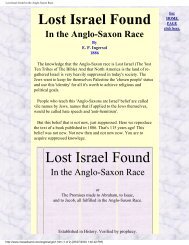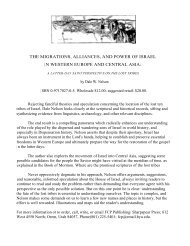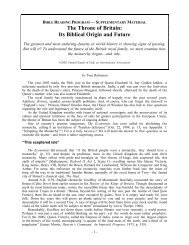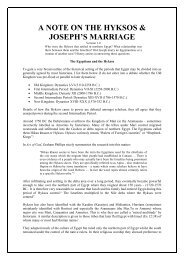HISTORY OF THE SABBATH - Friends of the Sabbath Australia
HISTORY OF THE SABBATH - Friends of the Sabbath Australia
HISTORY OF THE SABBATH - Friends of the Sabbath Australia
Create successful ePaper yourself
Turn your PDF publications into a flip-book with our unique Google optimized e-Paper software.
Chapter Nineteen – The <strong>Sabbath</strong> and First During <strong>the</strong> First Five CenturiesA learned English first-day writer <strong>of</strong> <strong>the</strong> seventeenth century, William Twisse, D. D., thusstates <strong>the</strong> early history <strong>of</strong> <strong>the</strong>se two days:"Yet for some hundred years in <strong>the</strong> primitive church, not <strong>the</strong> Lord's day only,but <strong>the</strong> seventh day also, was religiously observed, not by Ebion and Cerinthusonly, but by pious Christians also, as Baronius writeth, and Gomarusconfesseth, and Rivet also, that we are bound in conscience under <strong>the</strong> gospel,to allow for God's service a better proportion <strong>of</strong> time, than <strong>the</strong> Jews did under<strong>the</strong> law, ra<strong>the</strong>r than a worse." 2That <strong>the</strong> observance <strong>of</strong> <strong>the</strong> <strong>Sabbath</strong> was not confined to Jewish converts, <strong>the</strong> learned Gieslerexplicitly testifies:"While <strong>the</strong> Jewish Christians <strong>of</strong> Palestine retained <strong>the</strong> entire Mosaic law, andconsequently <strong>the</strong> Jewish festivals, <strong>the</strong> Gentile Christians observed also <strong>the</strong><strong>Sabbath</strong> and <strong>the</strong> passover, 3 with reference to <strong>the</strong> last scenes <strong>of</strong> Jesus' life, butwithout Jewish superstition. In addition to <strong>the</strong>se, Sunday, as <strong>the</strong> day <strong>of</strong> Christ'sresurrection, was devoted to religious services." 4The statement <strong>of</strong> Mosheim may be thought to contradict that <strong>of</strong> Giesler. Thus he says:"The seventh day <strong>of</strong> <strong>the</strong> week was also observed as a festival, not by <strong>the</strong>Christians in general, but by such churches only as were principally composed<strong>of</strong> Jewish converts, nor did <strong>the</strong> o<strong>the</strong>r Christians censure this custom as criminaland unlawful." 5It will be observed that Mosheim does not deny that <strong>the</strong> Jewish converts observed <strong>the</strong><strong>Sabbath</strong>. He denies that this was done by <strong>the</strong> Gentile Christians. The pro<strong>of</strong> on which he reststhis denial is thus stated by him:"The churches <strong>of</strong> Bithynia, <strong>of</strong> which Pliny speaks, in his letter to Trajan, hadonly one stated day for <strong>the</strong> celebration <strong>of</strong> public worship; and that wasundoubtedly <strong>the</strong> first day <strong>of</strong> <strong>the</strong> week, or what we call <strong>the</strong> Lord's day." 6The proposition tobe proved is this: The Gentile Christians did not observe <strong>the</strong> <strong>Sabbath</strong>. Thepro<strong>of</strong> is found in <strong>the</strong> following fact: The churches <strong>of</strong> Bithynia assembled on a stated day for<strong>the</strong> celebration <strong>of</strong> divine worship. It is seen <strong>the</strong>refore that <strong>the</strong> conclusion is gratuitous, andwholly unauthorized by <strong>the</strong> testimony. 7 But this instance shows <strong>the</strong> dexterity <strong>of</strong> Mosheim indrawing inferences, and gives us some insight into <strong>the</strong> kind <strong>of</strong> evidence which supports some<strong>of</strong> <strong>the</strong>se sweeping statements in behalf <strong>of</strong> Sunday. Who can say that this "stated day" was not<strong>the</strong> very day enjoined in <strong>the</strong> fourth commandment? Of <strong>the</strong> <strong>Sabbath</strong> and first day in <strong>the</strong> earlyages <strong>of</strong> <strong>the</strong> church, Coleman speaks as follows:"The last day <strong>of</strong> <strong>the</strong> week was strictly kept in connection with that <strong>of</strong> <strong>the</strong> firstday, for a long time after <strong>the</strong> overthrow <strong>of</strong> <strong>the</strong> temple and its worship. Downeven to <strong>the</strong> fifth century <strong>the</strong> observance <strong>of</strong> <strong>the</strong> Jewish <strong>Sabbath</strong> was continuedin <strong>the</strong> Christian church, but with a rigor and solemnity gradually diminishinguntil it was wholly discontinued." 8This is a most explicit acknowledgment that <strong>the</strong> Bible <strong>Sabbath</strong> was long observed by <strong>the</strong> body<strong>of</strong> <strong>the</strong> Christian church. Coleman is a first-day writer, and <strong>the</strong>refore not likely to state <strong>the</strong> casetoo strongly in behalf <strong>of</strong> <strong>the</strong> seventh day. He is a modern writer, but we have already provedhis statements true out <strong>of</strong> <strong>the</strong> ancients. It is true that Coleman speaks also <strong>of</strong> <strong>the</strong> first day <strong>of</strong>189


